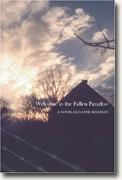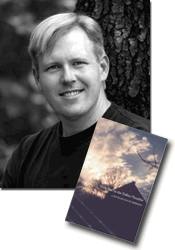An Interview with
Dayne Sherman
Interviewer Luan Gaines:
Is your novel based on a true story?
Dayne Sherman: No. Itís not a true story at all. Thatís the short answer. The novel is about political corruption and terrorism at the local level, and Louisiana has plenty of both. But the story is totally fabricated, fiction. This is not to say that it isnít plausible. Itís very plausible, a realistic story of the Florida Parishes in Southeast Louisiana where I grew up. Every reader steeped in the local cultureóso farósays I hit the nail on the head.
In the novel, you speak to the violence that simmers just beneath the surface of a land known for blood feuds and long memories. How does the South portrayed in Welcome to the Fallen Paradise differ from the more genteel portrayal?
I come from the lower classes, right at the bottom rung of Southern white society. Some time early in my apprenticeship as a writer I decided to tell about my own people. Part of this goes back to my graduate student days when I was studying history. I was interested in tenant farmers, civil rights workers, common folks, etc. I really donít care much about big white columns and debutante balls, and would just as soon let the hack writers have this segment of the South as material.
Another big thing happened in my early twenties, one day when I realized that I was a redneck of the first order. This doesnít mean racist. It simply means that I come from the Southern yeomanry. Iím proud of being a redneckóthough often ashamed at the way my people fall for demagoguery. If you think for a second I wonít pick up an animal I just hit on the highway, you are mistaken. Iíll cook a rabbit killed by a truck tire in a minute, and nothing tastes better than barbequed wild game shot out of season, preferably at night.
The genteel folks are just as violent as we are. They simply use the lower classes to do their violence so they can, like Pontius Pilate, keep their hands clean. For every murderous Byron De la Beckwith in Mississippi, there was a Governor Ross Barnett goading and encouraging.
What is the origin of the novel's title?
Well, it started as ďThe Necessary Business of Digging Graves,Ē a line from Lewis Nordanís Wolf Whistle novel. Through some trouble with Algonquin while the novel was still just a short story, I extracted the line and the title, and I quit trying to get permission to use it. Moral to this story: never use any copyrighted material in your fiction. Itís easy enough to make things up. Later I came upon Welcome to the Fallen Paradise, and it really felt good. It made sense, communicated what I was trying to say in the novel better than the first title I had in mind.
Is Cotton Moxley a bully, or does his character represent something else in the context of your story?
Cotton is the personification of evil at the street level, just as Sheriff Roberts is the personification of evil at the political level.
Cotton is not an ignorant bully. Heís the boogieman, a man with a spirit set on consuming others, a kind of Social Darwinist who manages to always stay on top, the kind of man who understands that the main advance of the Twentieth and Twenty-first Centuries is the ability to kill more efficiently than in centuries past. Heís at the top of the heap until he gets his ticket punched.
Moxley carries a lot of weight with important people. With this degree of corruption in the system, does Jesse really have a chance?
Jesse has no chance. But Iím a stoic. I placed Jesse in the situation to test him, to see what heís made of. Life is about the process, not the way it ends.
 Why does Cotton Moxley harbor such an intense dislike of Jesse Tadlock? Does he resent that Jesse refuses to back down?
Why does Cotton Moxley harbor such an intense dislike of Jesse Tadlock? Does he resent that Jesse refuses to back down?
There are two things that a Southerner will kill over quicker than anything else: Land and a hunting dog. So, Jesse taking the houseóno matter the situationócauses immediate deadlock and enmity between the two men. And vice versa, as Cotton pushes Jesse in a corner on both accounts.
When the other Tadlock men refuse to back Jesse, is it really because they have an old resentment against him or do they realize that they are too old too get through this kind of fight without serious damage?
I think the uncles have just kind of gotten soft, sissies. The feminization of the American man. Theyíre not too old, just too soft. Itís like the death of honor in the New South, or at least the death of courage that Iím writing about. So, theyíre just looking for an excuse to lay up on their asses and drink beer and watch soap operas. Of course, I am playing a bit with the way a child who hangs around the place is often favored in rural settings, the reverse Prodigal Son story. The lazy-ass child often gets the inheritance on account heís always nearby, always at home.
Uncle Red obviously understands the consequences of fighting alongside Jesse to protect his land, but does Red ever entertain the thought that he himself could be seriously injured?
Uncle Red is a stoic and canít even consider the consequence of bodily harm. Itís just something he walks into as fate would have it.
Grounded in family, loyalty is paramount to the Tadlock's. How does Jesse's sense of family override the rules of a society that ignores his needs?
Society is nothing compared to family and bonds of love and deep friendship. Part of it is the corruption of the polis. Society cannot be trusted, neither can its institutions. In Tadlockís world, even some of his own people canít be trusted.
It takes Jesse a long time to accept the inevitability of a showdown with Moxley. Why?
Heís naÔve. Heís just a good old boy trying hard to have a little peace. His head is spinning by all kinds of changes and he canít really keep up. It takes him a while to realize all hell is breaking loose and heíd better grab a-holt and fight fire with fire.
Uncle Red understands the nature of survival from his own experience. Why is it important for Jesse to learn for himself that a man is defined by his deeds?
Jesse has to learn this to become the patriarch of the Tadlock clan. It has to be learned or die. Jesse is Redís surrogate son.
Is Jesse prepared finally to die to protect his property? Is this a challenge to his honor most of all?
Itís not honor as such. Itís Jesseís innate Celtic clannishness popping out of his genetics. He has to avenge in order to sustain the family bond. Itís not an abstract thing like a ďmanís sacred honor.Ē His familyóRed, Cat, Latrice, and Pennyóis everything to him. It comes down to protecting those closest to him. Itís a tribal thing.
With Moxley as a formidable opponent, Jesse is tested in the most elementary way. For the sake of the story, could you let him fail?
He died off in one draft, as I recall. Couldnít let that happen, could I? In some ways, he does fail. Red is killed. The farmófor all practical purposesóis lost to him. Penny is injured. Carlin is almost killed. Jesse could have done a time in Angola. So, Jesse does lose some important things.
Welcome to the Fallen Paradise is the classic battle of good versus evil, yet we know that good doesn't always prevail. How did you view this conflict when planning the novel?
I donít believe good necessarily wins over evil, not in my general view of the world. So I make it a constant battle. Even good men and women can do evil. I try to make a great deal of ambivalence in my characters when I can. A turn one way or the other can push a person to the other side, slowly to the darkness.
Life was much simpler when men could avenge the perceived wrongs done to them, an eye for an eye and all that. In that context, what have the constraints of civilization done to curtail the primitive need for vengeance?
Thereís one thing that no reviewer has mentioned regarding the book. All the damn crazy stuff with Jesse could have been avoided if he was non-violent. If he took on a Ghandian-Martin Luther King approach, death could have been avoided. But he doesnít go the non-violent route and he loses his hero.
I write about crime and violence. This doesnít mean I advocate it. I write realism, so this is a part of realism: eye for an eye. I hope some people will read the book and say, ďHot damn, everybodyís fighting everybody else. Why donít we give this shit up for Lent?Ē
Besides an intriguing story, are you making a statement about a man's need to defend himself and his honor? Explain.
I just took a stab at the implied case for non-violence in my fiction. At the bottom, however, thereís something deep in the Southern consciousness about protecting the home place. I would argue that most of the Southern soldiers fighting in the Civil War were fighting over land and the Northern invasion, not the perpetuation of slavery. Some soldiers did have a lot at stake with slavery, but most didnít have a dog in that fight. Iíd go as far as to say that the American forces are learning that folks will fight over an outside invasion; weíre learning it once again in Iraq.
Did you grow up hearing stories like the one you write about in Welcome to the Fallen Paradise?
Absolutely. They were everywhere in my childhood. I soaked them up like a sponge.
Do you have more Southern tales like this to tell?
My God, I hope so. I hope I have at least one book a year of this stuff until I die.
Who are the Southern writers that have most influenced you?
Flannery OíConnor, Larry Brown, Will Campbell, Cormac McCarthy, Will D. Campbell, James Lee Burke, William Gay, Tom Franklin, Walker Percy. Many others. Tim Gautreaux was a great influence as a writer and teacheróthe best damned creative writing teacher in America; heís now retired from teaching.
Have you begun work on your next novel?
Yep. Itís a sequel, 4 years later. Just as bloody and suspenseful as my first novel.
As an author who has just published his first novel, what would you like to share about the experience with would-be writers?
Donít give up. Get the novel on paper as soon possible so you can have something to work with. Edit like hell. Donít quit your day job. Try to say something beautiful and new.
Dayne Sherman is a former high school dropout from Natalbany, Louisiana. In 1997 he earned a master's degree from Louisiana State University. His stories have been published in a number of literary magazines and anthologized in Stories from the Blue Moon Cafť III. Hard to Remember, Hard to Forget, a chapbook, was publised by Over the Transom in 2004.
Contributing reviewer Luan Gaines interviewed Dayne Sherman, author of Welcome to the Fallen Paradise (see accompanying review), about his book via email for curledup.com. No part
of this interview may be reproduced without permission. Luan Gaines/2004.


